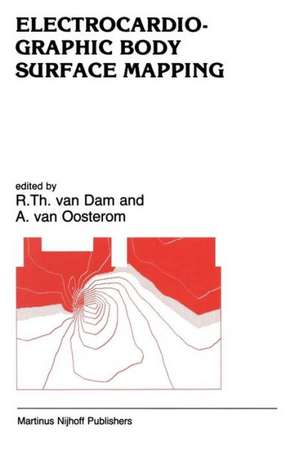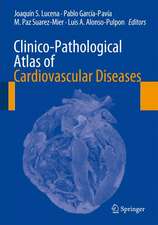Electrocardiographic Body Surface Mapping: Proceedings of the third International Symposium on Body Surface Mapping: Developments in Cardiovascular Medicine, cartea 60
Editat de H. E. van Dam, A. van Oosteromen Limba Engleză Paperback – 13 oct 2011
Din seria Developments in Cardiovascular Medicine
- 5%
 Preț: 1484.50 lei
Preț: 1484.50 lei - 5%
 Preț: 375.17 lei
Preț: 375.17 lei - 5%
 Preț: 354.10 lei
Preț: 354.10 lei - 5%
 Preț: 1419.03 lei
Preț: 1419.03 lei - 5%
 Preț: 376.43 lei
Preț: 376.43 lei - 5%
 Preț: 1098.27 lei
Preț: 1098.27 lei - 5%
 Preț: 1438.38 lei
Preț: 1438.38 lei - 5%
 Preț: 376.78 lei
Preț: 376.78 lei - 5%
 Preț: 368.37 lei
Preț: 368.37 lei - 5%
 Preț: 380.25 lei
Preț: 380.25 lei - 5%
 Preț: 2117.58 lei
Preț: 2117.58 lei - 5%
 Preț: 367.28 lei
Preț: 367.28 lei - 5%
 Preț: 366.56 lei
Preț: 366.56 lei - 5%
 Preț: 371.10 lei
Preț: 371.10 lei - 5%
 Preț: 370.94 lei
Preț: 370.94 lei - 5%
 Preț: 783.18 lei
Preț: 783.18 lei - 5%
 Preț: 713.18 lei
Preț: 713.18 lei - 5%
 Preț: 1098.27 lei
Preț: 1098.27 lei - 5%
 Preț: 375.49 lei
Preț: 375.49 lei - 5%
 Preț: 373.47 lei
Preț: 373.47 lei - 5%
 Preț: 723.93 lei
Preț: 723.93 lei - 5%
 Preț: 1104.13 lei
Preț: 1104.13 lei - 5%
 Preț: 2117.20 lei
Preț: 2117.20 lei - 5%
 Preț: 716.09 lei
Preț: 716.09 lei - 5%
 Preț: 372.03 lei
Preț: 372.03 lei - 5%
 Preț: 722.33 lei
Preț: 722.33 lei - 5%
 Preț: 660.07 lei
Preț: 660.07 lei - 5%
 Preț: 375.34 lei
Preț: 375.34 lei - 5%
 Preț: 1423.22 lei
Preț: 1423.22 lei - 5%
 Preț: 715.35 lei
Preț: 715.35 lei - 5%
 Preț: 790.69 lei
Preț: 790.69 lei - 5%
 Preț: 720.68 lei
Preț: 720.68 lei - 5%
 Preț: 3185.49 lei
Preț: 3185.49 lei - 5%
 Preț: 1418.27 lei
Preț: 1418.27 lei - 5%
 Preț: 784.64 lei
Preț: 784.64 lei - 5%
 Preț: 714.63 lei
Preț: 714.63 lei - 5%
 Preț: 370.74 lei
Preț: 370.74 lei - 5%
 Preț: 376.22 lei
Preț: 376.22 lei - 5%
 Preț: 660.85 lei
Preț: 660.85 lei - 5%
 Preț: 368.37 lei
Preț: 368.37 lei
Preț: 370.74 lei
Preț vechi: 390.25 lei
-5% Nou
Puncte Express: 556
Preț estimativ în valută:
70.94€ • 74.07$ • 58.71£
70.94€ • 74.07$ • 58.71£
Carte tipărită la comandă
Livrare economică 04-18 aprilie
Preluare comenzi: 021 569.72.76
Specificații
ISBN-13: 9789401084123
ISBN-10: 9401084122
Pagini: 332
Ilustrații: 313 p.
Dimensiuni: 155 x 235 x 17 mm
Greutate: 0.47 kg
Ediția:Softcover reprint of the original 1st ed. 1986
Editura: SPRINGER NETHERLANDS
Colecția Springer
Seria Developments in Cardiovascular Medicine
Locul publicării:Dordrecht, Netherlands
ISBN-10: 9401084122
Pagini: 332
Ilustrații: 313 p.
Dimensiuni: 155 x 235 x 17 mm
Greutate: 0.47 kg
Ediția:Softcover reprint of the original 1st ed. 1986
Editura: SPRINGER NETHERLANDS
Colecția Springer
Seria Developments in Cardiovascular Medicine
Locul publicării:Dordrecht, Netherlands
Public țintă
ResearchCuprins
1 Normals.- 1: Present and future of body surface electro-cardiographic mapping.- 2: Features of body surface potential maps from a large normal population.- 3: Evolution of body surface potentials in the healthy newborn during the first week of life.- 4: Recognition of epicardial breakthrough by body surface isopotential mapping.- 2 Myocardial Infarction.- 5: Isopotential mapping in acute myocardial infarction.- 6: Body surface isopotential maps in old anterior myocardial infarction undetectable by 12 lead electrocardiograms.- 7: Body surface map criteria for quantitating infarct as derived from computer simulations.- 8: Body surface mapping: contribution and limits for the diagnosis of right ventricular myocardial infarction in patients with posterior, inferior or deep septal left ventricular myocardial infarction.- 9: The diagnostic performances of visual examination of BSM and of ECG/VCG in the identification of chronically infarcted left ventricular segments.- 3 Conduction Distubances.- 10: Body surface potential mapping in conduction abnormalities.- 11: Validation (test set) of a method for detecting associated heart conditions in LBBB by means of BSM.- 12: Localization of pre-excitation sites in the Wolff-Parkinson-White syndrome by body surface potential mapping and a single moving dipole representation.- 13: Comparison of body surface mapping and phase display methods to localize bypass pathways in Wolff-Parkinson-White syndrome.- 14: Body surface map and location of origin of ventricular tachycardia. Comparison with epicardial map.- 15: Localization of cardiac electrical activity by a single moving dipole for ventricular tachycardia in dog: validation by epicardial activation mapping.- 16: Isointegral analysis of body surface maps of ventricular premature beats.- 17: Chest mapping in the evaluation of pseudoischemic T waves related to intermittent left bundle branch block.- 4 Recording and Display Techniques.- 18: Continuous digital recording of 240 ECG leads for body surface potential mapping.- 19: Grid of electrodes used at the institute of general physiology, Parma, Italy.- 20: Towards a common DATA-FORMAT in Cardiac potential mapping.- 21: Proposal for “standardization of the body surface potential mapping system”.- 22: Data representation problems of body surface potential mapping.- 23: The display of body surface maps.- 5 Data Analysis.- 24: Use of orthogonal expansions for representing body surface potential maps.- 25: Multivariate analysis of body surface potential maps for the diagnosis of myocardial infarction before and after temporal and spatial data reduction.- 26: Orthogonal expansion of epicardial and body surface ECG potentials.- 27: Usefulness of time-integral analysis of body surface potential maps.- 28: Do body surface maps contain more information than the ECG?.- 29: Representation of electrocardiographic body surface maps by cylindrical regression coefficients.- 30: Automated quantitative vectorcardiography: the Louvain VCG-computer program.- 31: Quantitative vectorcardiography. A spatial approach as the basis of a new diagnostic logic.- 6 Model Studies.- 32: Forward problem simulations of the Wolff-Parkinson-White syndrome with a multiple- dipole heart model.- 33: The relationship between body surface and epicardial potentials: a theoretical model study.- 34: Accuracy of epicardial potentials inversely reconstructed from body surface measurements.- 35 Comparison of several solutions of the forward potential problem for a finite conducting cylinder.- 36: 3-dimensional propagation model for simulationof the ventricular depolarization processes and induced body surface potentials.- 37: Moving dipole analysis in normal and myocardial infarction.- Discussion.- Authors Index.- List of Addresses.






